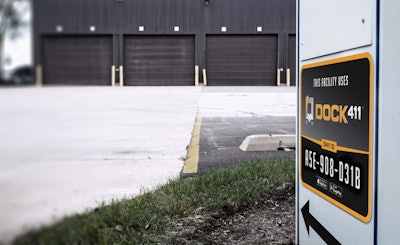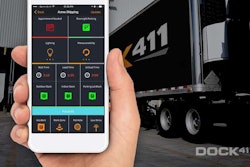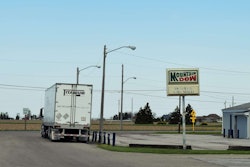In addition to the case of shipper Unilever’s Newville, Pa., facility, which I wrote briefly about last week, there are plenty other shippers and receivers who do make parking options available to drivers when space allows. Owner-ops who specialize on particular lanes or are dedicated to one customer or another often speak of such arrangements, yet they’re hardly the norm.
At once, in the wake of the ELD mandate coming into effect last December, notes Heartland Express driver Bob Stanton, “the term ‘shipper/receiver of choice’ is getting a lot of traction,” particularly as it relates to load/unload efficiency and the ability to park at least somewhat securely for longer periods when out of hours. “If I’ve got a choice on a well-reviewed customer or a negatively reviewed one – who am I going to choose?”
Stanton, when I spoke to him about this, was working the Mid-America Trucking Show booth for the Dock411 smartphone app/service, which enables such reviewing. Dock411 has been crowd-sourcing and verifying information about loading dock locations all around the nation for the last few years. Free to truckers, within the app users can add information about and comments on more than 100,000 facilities. An update to version three of the app, rolled out just ahead of MATS in March, notes Dock411’s Daniel Serewicz, delivered further on the company’s mission to take trucker-user suggestions as to what kind of information is provided on each location.
 This example metal sign provides a shipper’s Dock411 app information to incoming truckers and is offered as a benefit to shippers who participate in Dock411’s new subscription-based service for them. Dock411’s Daniel Serewicz hopes his company’s app will be a utility for truckers and shippers alike to save time on phone calls for directions and, increasingly, parking options nearby or on-site. Photo courtesy of Dock411
This example metal sign provides a shipper’s Dock411 app information to incoming truckers and is offered as a benefit to shippers who participate in Dock411’s new subscription-based service for them. Dock411’s Daniel Serewicz hopes his company’s app will be a utility for truckers and shippers alike to save time on phone calls for directions and, increasingly, parking options nearby or on-site. Photo courtesy of Dock411Serewicz notes version one provided up to 15-20 attributes on each location within the app, while version three now is capable of “collecting 75 different attributes about each shipper location.”

Also now available is a subscription-based version of the app specifically for shippers, which allows them, depending on the level at which they’re involved, to outline services they offer to truckers, and to promote their unique “D411 ID,” an eight-digit code that can be supplied to app users ahead of arrival to grease the skids on sharing information about dock locations, availability of restrooms, and parking, of course.
Serewicz agrees with Stanton that facilities’ desire to be a “shipper/receiver of choice” is more than just a pie in the sky notion. As the ELD mandate has constrained capacity further than it already had been, they’re asking themselves, “’Do drivers want to come to our facility?’” Serewicz says. “Bad shippers will either pay more” for their transport needs or “be that shipper of choice.”
Now, at least, those truly interested shippers can use the service to find out what truckers are saying about them, and drivers can cross reference what shippers are saying about themselves with what their trucking peers are saying to get a more complete picture.
Parking information at or near the facility is increasingly a part of the information provided. Serewicz notes that information will be refined in the near future to include not just whether overnight parking is available but whether any parking is available for short-term or long-term situations and if overnight stays are possible for a 10-hour break on-site or nearby.
The larger the shipper, he adds, the more the company is aware of the need for parking in his experience. “We’re working with a Fortune 50 company right now,” he says, for whom the desire to provide parking options is a “real thing in their initiatives.”
 What’s been your experience parking at shipper/receiver locations since the ELD mandate? If you’re reading on a smartphone, tap the image to call and leave a message on our podcast line with your story. If you’re on a desktop, call 530-408-6423. Make sure to tell us your name and state of residence.
What’s been your experience parking at shipper/receiver locations since the ELD mandate? If you’re reading on a smartphone, tap the image to call and leave a message on our podcast line with your story. If you’re on a desktop, call 530-408-6423. Make sure to tell us your name and state of residence.I’m reminded a bit of my recent conversation with OOIDA board member owner-operator Tilden Curl, who says his work with the National Coalition on Truck Parking has moved in the direction of stressing to local governments the need for commercial facilities – those that could be expected to attract trucks to an area – to provide truck parking when being developed. The town of North Bend along the busy I-90 corridor in his home state of Washington famously, a few years back, banned new truck stop development in the city limits, where Curl’s “been involved in a couple of meetings” fairly recently, likewise with Washington State’s DOT.
“The problem with North Bend,” he says, is “there’s a mountain right next to their city. It’s not like they can push the parking problem down the road, and everybody else has pushed it right up to their doorstep.”
Curl’s looking for reasonable solutions to help facilitate parking capacity development in the area, where most parking is situated in a 150-truck-capacity TA stop. Just about any night, however, “there’s upward of 200 trucks” parked in the area around it, Curl says.
Curl’s promoting the development of a mile-long bit of median acreage near where I-90 meets Highway 18 West of the town. “It would relieve a lot of the stress on North Bend,” he says. “And to deal with this in the future, we have to write something in our laws to mandate a certain amount of parking spaces for each business there, like we do for handicap parking. If we’re going to have commercial interests developing more, … we’re going to have to require truck parking spaces at these interests.”
If such ideas take hold around the nation, so-called “shippers of choice,” and those who continue to ignore the parking issues, may lose their own choice in the matter of whether to provide truck parking.










